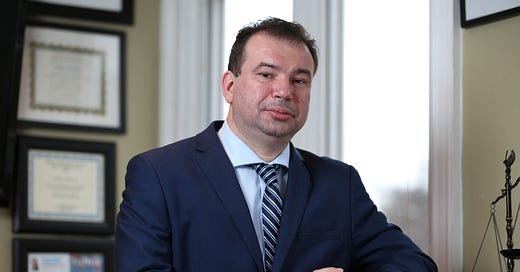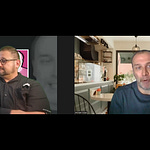Jeff Deskovic joins me for the latest podcast.
In January 1991, Deskovic, who was sixteen at the time of the crime, was convicted of raping and killing his classmate Angela Correa.
Jeff is wrongfully convicted, having been exonerated for more than a decade. He was convicted in large part based on a false confession. Here is more of his story.
Deskovic was taken to a private polygraph business run by an officer with the local Sheriff’s Department, who, according to trial testimony, had been hired to “get the confession.” Deskovic was held in a small room there with no lawyer or parent present. He was provided with coffee throughout the day but no food. In between polygraph sessions, detectives interrogated Deskovic.
Deskovic’s alleged confession occurred after six hours, three polygraph sessions, and extensive questioning by detectives between sessions. One of the detectives accused Deskovic of having failed the test and said he had been convinced of Deskovic’s guilt for several weeks. According to the detective, Deskovic then stated he “realized” three weeks ago he might be the responsible party. Deskovic was asked to describe the crime and began speaking in the third person, switching to first person part way through the narrative. Deskovic said, “I lost my temper” and admitted he had hit the victim in the head with a Gatorade bottle, put his hand over her mouth and kept it there too long. During the confession, Deskovic sobbed. By the end of the interrogation, he was under the table, curled up in the fetal position, crying.
Jeff described this scene, along with the medical examiner lying in his case, the prosecution withholding evidence, and he described how his public defender dropped the ball by not presenting his alibi and other trial missteps.
The result was that he spent sixteen years in jail for a crime he did not commit.
Since he’s gotten out, Jeff has started the Jeff Deskovic Foundation and we talked about some of the laws he has lobbied on behalf of and some of the politicians he has endorsed.
Finally, we talked about some of the cases he’s working on to free others who are wrongfully convicted.
One case he mentioned is Andre Brown. Here is more on that case.
In January 1999, two teenagers — O'Neill Virgo and Shawn Nicholson — were shot by a masked gunman in the Bronx and both were seriously injured.
Five days later, Brown, who was a student at the Borough of Manhattan Community College, turned himself in to police after he was allegedly identified as the shooter by a woman who was stuck in traffic near the shooting. That woman later picked him out of a lineup, Brown's attorney said.
In March of 2000, Brown was convicted of two counts of attempted murder and sentenced to 40 years in prison.
Fast forward 22 years, and Michelen, alongside his co-attorney Jeffrey Deskovic — who is an exoneree himself, freed after serving 16 years in prison — say Brown never got a fair trial.
Jeff said Andre was convicted primarily due to two eyewitnesses; he called eye witness testimony the most unreliable form of evidence.
One witness, Jeff told me, refused to testify at the trial after being threatened so her grand jury testimony was used, which forbade Andre from confronting his accuser, a constitutional right.
Jeff also described prison, “I don’t think they {the public} realize that it’s kind of like a non-stop obstacle course, with the guards, other prisoners, and the civilians as obstacles to the main goal, which is to overturn your conviction. The food was terrible, there was a lot of violence there. There was lot of verbal abuse from the guards to the prisoners. There was a lot of prisoner on prisoner violence.”
He continued, “There were a number of time during my incarceration when I was beat. One time I nearly lost my life.”















Share this post